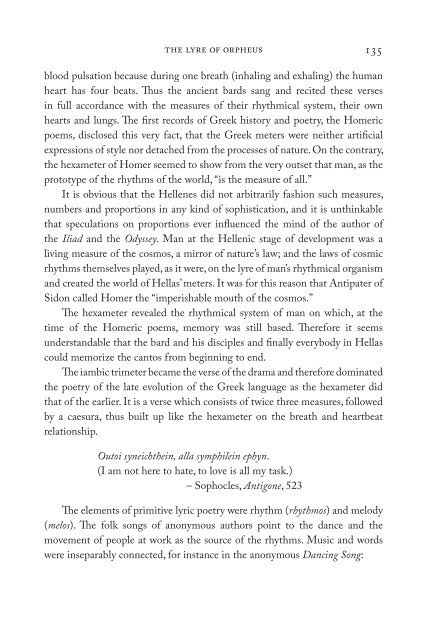The Gospel of Hellas - Research Institute for Waldorf Education
The Gospel of Hellas - Research Institute for Waldorf Education
The Gospel of Hellas - Research Institute for Waldorf Education
You also want an ePaper? Increase the reach of your titles
YUMPU automatically turns print PDFs into web optimized ePapers that Google loves.
the lyre <strong>of</strong> orpheus<br />
blood pulsation because during one breath (inhaling and exhaling) the human<br />
heart has four beats. Thus the ancient bards sang and recited these verses<br />
in full accordance with the measures <strong>of</strong> their rhythmical system, their own<br />
hearts and lungs. <strong>The</strong> first records <strong>of</strong> Greek history and poetry, the Homeric<br />
poems, disclosed this very fact, that the Greek meters were neither artificial<br />
expressions <strong>of</strong> style nor detached from the processes <strong>of</strong> nature. On the contrary,<br />
the hexameter <strong>of</strong> Homer seemed to show from the very outset that man, as the<br />
prototype <strong>of</strong> the rhythms <strong>of</strong> the world, “is the measure <strong>of</strong> all.”<br />
It is obvious that the Hellenes did not arbitrarily fashion such measures,<br />
numbers and proportions in any kind <strong>of</strong> sophistication, and it is unthinkable<br />
that speculations on proportions ever influenced the mind <strong>of</strong> the author <strong>of</strong><br />
the Iliad and the Odyssey. Man at the Hellenic stage <strong>of</strong> development was a<br />
living measure <strong>of</strong> the cosmos, a mirror <strong>of</strong> nature’s law; and the laws <strong>of</strong> cosmic<br />
rhythms themselves played, as it were, on the lyre <strong>of</strong> man’s rhythmical organism<br />
and created the world <strong>of</strong> <strong>Hellas</strong>’ meters. It was <strong>for</strong> this reason that Antipater <strong>of</strong><br />
Sidon called Homer the “imperishable mouth <strong>of</strong> the cosmos.”<br />
<strong>The</strong> hexameter revealed the rhythmical system <strong>of</strong> man on which, at the<br />
time <strong>of</strong> the Homeric poems, memory was still based. <strong>The</strong>re<strong>for</strong>e it seems<br />
understandable that the bard and his disciples and finally everybody in <strong>Hellas</strong><br />
could memorize the cantos from beginning to end.<br />
<strong>The</strong> iambic trimeter became the verse <strong>of</strong> the drama and there<strong>for</strong>e dominated<br />
the poetry <strong>of</strong> the late evolution <strong>of</strong> the Greek language as the hexameter did<br />
that <strong>of</strong> the earlier. It is a verse which consists <strong>of</strong> twice three measures, followed<br />
by a caesura, thus built up like the hexameter on the breath and heartbeat<br />
relationship.<br />
Outoi syneichthein, alla symphilein ephyn.<br />
(I am not here to hate, to love is all my task.)<br />
– Sophocles, Antigone, 523<br />
<strong>The</strong> elements <strong>of</strong> primitive lyric poetry were rhythm (rhythmos) and melody<br />
(melos). <strong>The</strong> folk songs <strong>of</strong> anonymous authors point to the dance and the<br />
movement <strong>of</strong> people at work as the source <strong>of</strong> the rhythms. Music and words<br />
were inseparably connected, <strong>for</strong> instance in the anonymous Dancing Song:

















